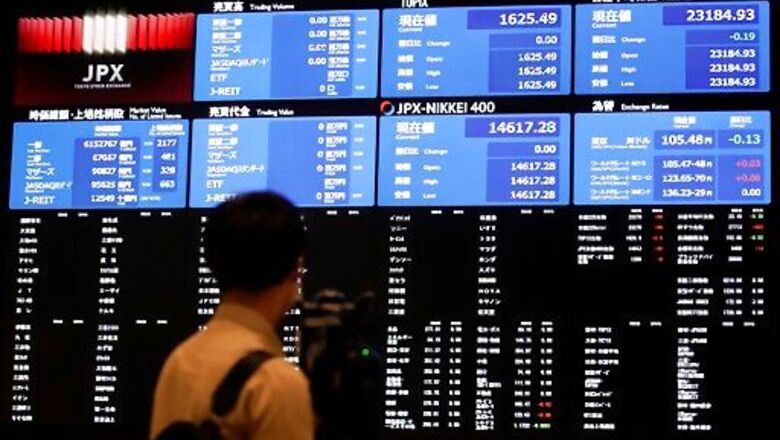
views
NEW YORK: Wall Street is ticking higher in Thursday morning trading with hopes that Washington can get past its partisanship to deliver more support for the economy.
The S&P 500 was 0.3% higher as talks continue on a deal that could send more cash to Americans, restore jobless benefits for laid-off workers and deliver assistance to airlines and other industries hit particularly hard by the pandemic.
The Dow Jones Industrial Average was up 19 points, or 0.1%, at 27,801, as of 10:06 a.m. Eastern time, and the Nasdaq composite was 1% higher.
The moves were tentative, though, and the S&P 500 lost most of its earlier gain of 1%. The Dow had been up 259 points. Trading has been notably erratic in recent weeks, with several big shifts in momentum pushing markets around within a day.
Treasury yields also ticked higher after a report indicated the pace of layoffs across the country may have slowed last week. The number of workers filing for unemployment benefits fell to 837,000 from 873,000 the prior week. Its a larger decline than economists expected, though the number remains incredibly high compared with before the pandemic.
Other economic reports were mixed. Consumer spending strengthened by more than expected in August, which is key because it’s the main driver of the U.S. economy. But personal incomes weakened by more than expected, and growth in the country’s manufacturing sector also fell short of forecasts.
The data add to an already cloudy picture on the economy, which has seen some slowdowns recently after the last round of stimulus approved by Congress expired. The Walt Disney Co. and other major companies have announced even more layoffs this week, and the clock is ticking on Washington to offer more support.
The CEO of American Airlines said that it would reverse the furloughs of 19,000 workers if Washington can reach a deal with $25 billion for airlines over the next few days. United Airlines told government leaders that it could also undo the furloughs of 13,000 workers.
Airline stocks were higher in Thursday morning trading, at least for now. American Airlines climbed 1.4%, and United Airlines was up 0.3%, though their movements were volatile.
Rising and falling hopes for a deal on Capitol Hill sent stocks on a roller-coaster ride Wednesday, much as they have over the last several weeks.
Treasury Secretary Steven Mnuchin and House Speaker Nancy Pelosi spoke for 90 minutes on Wednesday, and hopes for an agreement helped send the S&P 500 up as much as 1.7% during the day. But after Pelosi said in the afternoon that they still had areas where we are seeking further clarification, the index gave up all but 0.1% of its gain before resuming momentum at the end of the day.
The pair have worked effectively together in the past, and they helped drive through the previous economic rescue approved by Congress in March. But the countrys partisan divide has only deepened since then, which has stymied progress on aid that investors say is crucial for the economy. The next election is only about a month away.
The yield on the 10-year Treasury rose to 0.70% from 0.69% late Wednesday.
In Asian markets, trading on the Tokyo Stock Exchange was suspended due to a technical failure in its computer systems.
The Tokyo Stock Exchange said it plans for normal trading to resume on Friday. Officials said trading was halted early Thursday because rebooting the huge system after the malfunction would have caused confusion.
TSE President Koichiro Miyahara repeatedly apologized for the disruption to trading on the worlds third largest exchange, where about 70% of brokerage trading both by value and volume is by foreigners.
The outage on the exchange eclipsed Japans main economic news of the day, the first improvement in manufacturing sentiment in three years, despite the pandemic.
Trading in stock markets for South Korea, Hong Kong and mainland China was closed for national holidays.
In Europe, Germanys DAX returned 0.1%, and Frances CAC 40 rose 0.6%. The FTSE 100 in London added 0.3%.
A report showed that unemployment rose for the fifth straight month among countries that use the euro amid concern that extensive government support programs wont be able keep many businesses hit by coronavirus restrictions afloat indefinitely.
___
AP Business Writer Yuri Kageyama contributed.
Disclaimer: This post has been auto-published from an agency feed without any modifications to the text and has not been reviewed by an editor
















Comments
0 comment